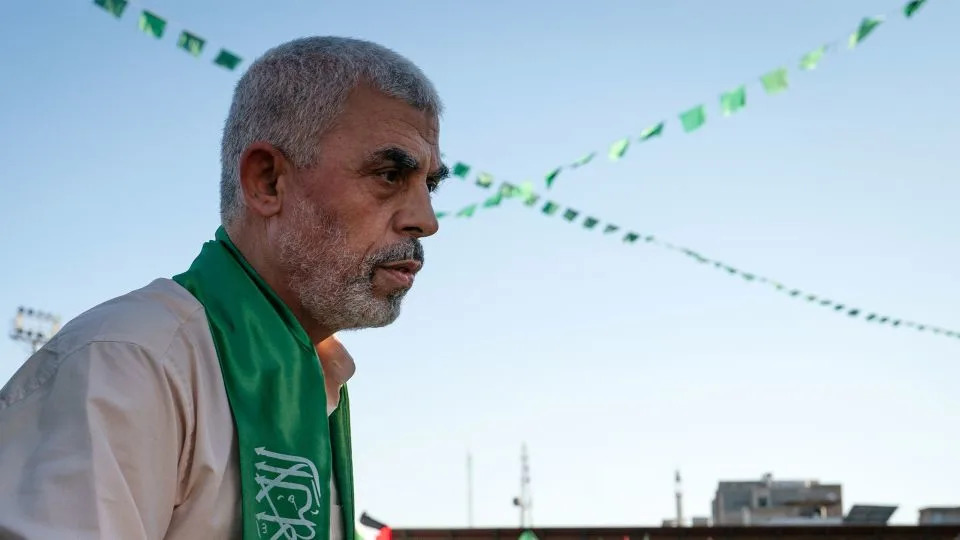Yahya Sinwar appears more interested in cementing his own position than securing peace in Gaza.
The mastermind behind Hamas’s Oct 7 attacks on Israel is stalling ceasefire talks and using the mounting Palestinian death toll to his advantage, leaked messages show.
Correspondence between Yahya Sinwar, the terror group’s military leader, and officials tasked with brokering a ceasefire with Qatari and Egyptian officials indicate he is more interested in securing his own future than peace.
“We have the Israelis right where we want them,” Sinwar said in one of dozens of messages to ceasefire negotiators obtained by The Wall Street Journal.
The messages display a calculated disregard for human life and a belief on the part of Sinwar that Israel has more to lose from the eight-month war than Hamas.
More than 37,000 people, mainly civilians, have been killed in Gaza since the start of the war, according to Hamas-controlled health authorities. The number of combatants killed remains unknown.
The messages revealed by The Wall Street Journal appear to support the view that Sinwar is willing to put his political objectives above the preservation of human lives.
In one message to Hamas leaders in Doha, he cites civilian losses in national-liberation conflicts in places such as Algeria, where hundreds of thousands of people died fighting for independence from France, saying, “these are necessary sacrifices”.
In a separate letter, sent on April 11 to Ismail Haniyeh, a Hamas political leader, whose three sons were killed in an Israeli air strike, Sinwar claimed their deaths and those of other Palestinians would “infuse life into the veins of this nation, prompting it to rise to its glory and honour”.
A recent analysis appears to show a decline in the rate of women and children being killed from more than 60 per cent in October to below 40 per cent in April, coinciding with a change in Israeli battlefield tactics.
However, the reported deaths of at least 274 Palestinians in the Nuseirat refugee camp during the rescue of four Israeli hostages on Saturday has fuelled international anger about Israel’s handling of the war and whether it is doing enough to protect civilians.
AfriPrime App link: FREE to download...
https://www.amazon.com/Africircle-AfriPrime/dp/B0D2M3F2JT
In response, the Israel Defence Forces (IDF) condemned the “cruel and cynical” tactics of Hamas’s leadership to endanger the local population by hiding hostages among them.
On Tuesday, Hamas responded to a US-backed Israeli ceasefire proposal transmitted to Qatar two weeks ago which would first allow for a six-week truce to exchange some of the remaining 120 Israeli hostages for more than 1,000 Palestinian prisoners.
A source said the terror group’s response contained amendments to the Israeli proposal including “a timeline for a permanent ceasefire and the complete withdrawal of Israeli troops from the Gaza Strip”.
It is understood there is a split between the group’s political leadership which would be open to the six-week truce and the military leadership which wants a full ceasefire.
The three-stage peace deal, which sets out a framework for the eventual release of all hostages, a permanent ceasefire and full Israeli withdrawal from Gaza, has stalled over the terms of how to proceed after the first phase and bring an eventual end to the war.
The fine details of how the war ends could determine the political future of the Israeli and Hamas leadership and, for Sinwar, possibly his physical survival.
During a trip to Israel on Monday, Antony Blinken, the US secretary of state, urged top officials to accept and implement a plan for post-war Gaza. He also pushed for more international pressure on Hamas to agree to a ceasefire proposal.
“My message to governments and people throughout the region is this: If you want to alleviate the terrible suffering in Gaza, to get all the hostages home, to put Israelis and Palestinians on the path to durable peace — then press Hamas to say yes to the ceasefire,” he said in a statement on social media.
AfriPrime App link: FREE to download...
https://www.amazon.com/Africircle-AfriPrime/dp/B0D2M3F2JT
Hamas gambled on the suffering of civilians in Gaza. Netanyahu played right into it
Yahya Sinwar has so far survived eight months of Israeli’s brutal military campaign to kill him. His longevity is a personal victory for the Hamas leader – and increasingly appears to be grim vindication of his decision to seize the initiative in the generational Palestinian struggle with Israel by launching a bloody attack on October 7 that would plunge Gaza’s two million residents into a predictable hell.
Israeli Prime Minister Benjamin Netanyahu, and his military responded as expected to Sinwar’s onslaught of terror that killed more than 1,200 people and saw over 220 taken hostage, declaring war and vowing to destroy Hamas.
Predictably too, according to many regional diplomats, Israel’s military campaign is failing to deliver on the dismantling of Hamas, even as the number of Palestinians killed soars past 36,000. While Hamas is people and structures, they argue, it is also an ideology.
Now Sinwar – who speaks fluent Hebrew and has a nuanced knowledge of Israeli politics – believes he still has the war’s initiative, amid high-stakes bargaining with Israel for a ceasefire and hostage deal.
“We have the Israelis right where we want them,” he is said to have told other Hamas leaders, in leaked messages reported by The Wall Street Journal. He appeared to justify the deaths of Palestinian civilians as a “necessary sacrifice” according to the messages.
If this were a conventional war, it would be easy to write Sinwar off as deluded; Israel has the upper hand by far in conventional weapons. But the weapons’ devastating effectiveness is becoming a liability in this asymmetric conflict, and against the backdrop of a tortured history that Sinwar is adroitly weaponizing against Israel.
Because of the enormous civilian casualties and suffering inflicted by Israel in its pursuit of Hamas, Netanyahu now faces a possible arrest warrant for war crimes from the ICC, the world’s top court – just like Sinwar. And the consequences for Netanyahu are far more serious than for Hamas’ leader, because Sinwar is already a renowned terrorist hiding in a tunnel with limited prospects and Netanyahu is a global leader whose world will dramatically shrink if the ICC issues warrants.
Netanyahu dismisses the ICC as anti-Semitic, but that hasn’t neutralized the damage in the court of international opinion. Meanwhile, Sinwar can sit back and cash in on the international anger over Palestinian suffering.
AfriPrime App link: FREE to download...
https://www.amazon.com/Africircle-AfriPrime/dp/B0D2M3F2JT
Wind in Sinwar’s sails
Earlier this year, university campuses across the United States and Europe combusted in spontaneous protest over the toll of Israel’s war on civilians in Gaza, where humanitarians warn of a growing hunger crisis.
For the first time, a generation of Palestinian were able to witness what they’d always hoped for, a potent political force able to rival what they’ve always perceived as an over loud, over pervasive and over powerful lobby for Israeli interests.
In any other year this may have been irrelevant, but Biden’s back is to the wall in the upcoming US presidential election. He has pledged unwavering support to Israel and continues to send weapons to Israel’s military, but if he stays the course, Biden risks losing vital votes in swing states from a new generation of left-leaning Democrats. He can’t ignore the protesters’ anger about Gaza’s plight.
This puts wind in Sinwar’s political sails. His negotiating team has gotten tougher: first appearing to be on the verge of compromise, then holding out for a permanent ceasefire and complete withdrawal of Israeli forces from Gaza. He also appears to have brought the reality of a Palestinian state closer too – a political coup following decades of stultifying inertia.
US regional allies, notably Saudi Arabia, have set an “irreversible” path to a two-state solution as part of their price for buy-in to help Gaza rebuild. And while Netanyahu’s far-right ministers predictably say no to Palestinian statehood, some Western partners are showing they’re fed up with Israeli intransigence.
In recent weeks, Ireland, Spain, Norway and Portugal, all frustrated Netanyahu won’t agree a peace deal, have formally recognized Palestinian statehood. The statements mark a remarkable departure from their previously cautious approach to Netanyahu’s belligerence.
Israel has lashed out against the four European nations, but this doesn’t sting Sinwar. He is able to hunker down deep below Gaza and relish the hell he has unleashed above and the repercussions he gambled on.
Hamas’s ideology thrives under the current Israeli attacks, precisely because it was born of, and nurtured on, that very narrative. The war Sinwar started has taken Palestinian suffering to the next level – and Netanyahu has played right into it.
None of this means Sinwar will be winning a popular vote in Gaza during his lifetime, however long or short that may be. But the enormous bloodshed he precipitated has allowed him to tap into global moral outrage. He is now playing the Democratic world against itself, and his tools are the very values that developed nations hold sacrosanct: sanctity of life and fair play.
From a position of apparent weakness, he tries to turn every apparent disadvantage to advantage. On the cusp of Israel’s imminent Rafah operation, he tried to stall it by claiming to accept an Egyptian peace deal that he said Israel had accepted – with his officials briefing details of the mechanics and timings of how hostage releases would work.
As expected, the tactic spun up already febrile Israeli street protest against Netanyahu to a new level. Demonstrators demanded Netanyahu forestall the Rafah operation in favor of a seemingly tantalizingly close hostage release deal.
AfriPrime App link: FREE to download...
https://www.amazon.com/Africircle-AfriPrime/dp/B0D2M3F2JT
Who’s calling the shots in Gaza
According to regional diplomats, many of Sinwar’s power plays were entirely predictable. Decades of Israeli failure to address Palestinians’ security and economic concerns outside of Israel’s perceived interests set the table for Sinwar’s challenge, and what he could expect to achieve.
Sinwar’s power amid the war seems to be becoming part of the perceived wisdom about Gaza and the war. In Israel on Tuesday, US Secretary of State Antony Blinken said, “I don’t think anyone other than the Hamas leadership in Gaza actually are the ones who can make decisions.”
Even if Sinwar were inclined to solicit input from Hamas’s well-heeled leadership cadre sitting in the comfort of Doha, and meeting leaders in Iran and Turkey, the likelihood they can bridge the gaps in their thinking through detailed discussion is almost nil. Unfettered communication away from Israel’s prying ears and eyes is impossible.
In the final days before Northern Ireland’s momentous 1998 Good Friday Peace Agreement between the IRA’s political wing Sinn Fein and the British government, I watched the group’s top leaders emerge from the talks locked in intense, semi-silent conspiratorial whispers, slowly pacing adjacent gardens.
But such conversations are likely a luxury Sinwar neither has, nor dares risk taking, from wherever he is hiding in Gaza. And like any leader convinced he is proving his point, he is unlikely to back down now unless his key demands are locked in.
His recent warning that Israel will have to fight for Rafah strongly suggest he is still in the process of bargaining.
Blinken didn’t mention Sinwar by name in his remarks Tuesday, but there was no need. Everyone in the room understood who he meant when he added, “That is what we are waiting on.”
And if messages of pressure to make a deal are reaching Sinwar he will also understand them for another part of what they are – an attempt to turn Gazans desperate for an end to the conflict against him.
As much as Sinwar has put the psychological screws on Israel’s leadership, he can be made vulnerable too. And if past experience is any measure, he will likely gamble that he can play mind games better than Netanyahu.
AfriPrime App link: FREE to download...




